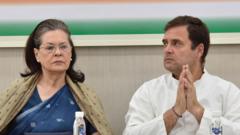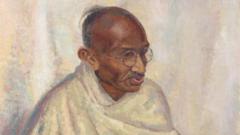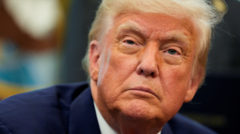Sonia and Rahul Gandhi have been charged with money laundering, sparking nationwide protests by the Congress party in defense of the leaders.
India's Gandhis Face Money Laundering Charges as Protests Loom

India's Gandhis Face Money Laundering Charges as Protests Loom
Opposition extends solidarity amid allegations against Congress leaders
In a significant escalation of political tensions in India, the Enforcement Directorate (ED) has officially charged senior Congress leaders Sonia and Rahul Gandhi with involvement in a money laundering scheme tied to the assets of the National Herald newspaper. This development follows a complaint lodged in 2021 by Subramanian Swamy, a member of the governing Bharatiya Janata Party (BJP), alleging that the Gandhis had formed a shell company to illegitimately seize properties worth over 20 billion rupees ($233 million) associated with the now-defunct newspaper.
Reacting to the charges, Congress spokesperson Jairam Ramesh condemned the ED's findings as an act of political vendetta and intimidation orchestrated by the current government. While the Gandhis have yet to issue an official statement regarding the allegations, the party has called for nationwide protests on Wednesday to express solidarity and challenge what they see as government overreach.
The charges implicate several individuals and others affiliated with the Congress party, including overseas chief Sam Pitroda. The ED claims that the alleged illegal activities allowed Young Indian—a company founded by the Gandhis and other Congress leaders—to acquire valuable properties for a mere fraction of their worth. The investigation's details indicate that the agency has initiated efforts to freeze assets totaling 6.6 billion rupees linked to Young Indian in multiple urban areas, including Delhi and Mumbai.
Historically, the National Herald newspaper was founded in 1938 by Jawaharlal Nehru, India's first prime minister, and was pivotal during the country's independence movement. Its financial troubles led to a cessation of publication in 2008. After Congress intervened, the outlet was relaunched digitally in 2017.
This case is set to be heard again on April 25, further intensifying the political landscape as the opposition fears ongoing tactics by the Modi government to target political rivals through the ED. Recent reports have highlighted that approximately 150 opposition politicians have faced inquiries or investigations since Modi took office in 2014, raising questions about the agency's independence.
Reacting to the charges, Congress spokesperson Jairam Ramesh condemned the ED's findings as an act of political vendetta and intimidation orchestrated by the current government. While the Gandhis have yet to issue an official statement regarding the allegations, the party has called for nationwide protests on Wednesday to express solidarity and challenge what they see as government overreach.
The charges implicate several individuals and others affiliated with the Congress party, including overseas chief Sam Pitroda. The ED claims that the alleged illegal activities allowed Young Indian—a company founded by the Gandhis and other Congress leaders—to acquire valuable properties for a mere fraction of their worth. The investigation's details indicate that the agency has initiated efforts to freeze assets totaling 6.6 billion rupees linked to Young Indian in multiple urban areas, including Delhi and Mumbai.
Historically, the National Herald newspaper was founded in 1938 by Jawaharlal Nehru, India's first prime minister, and was pivotal during the country's independence movement. Its financial troubles led to a cessation of publication in 2008. After Congress intervened, the outlet was relaunched digitally in 2017.
This case is set to be heard again on April 25, further intensifying the political landscape as the opposition fears ongoing tactics by the Modi government to target political rivals through the ED. Recent reports have highlighted that approximately 150 opposition politicians have faced inquiries or investigations since Modi took office in 2014, raising questions about the agency's independence.
















